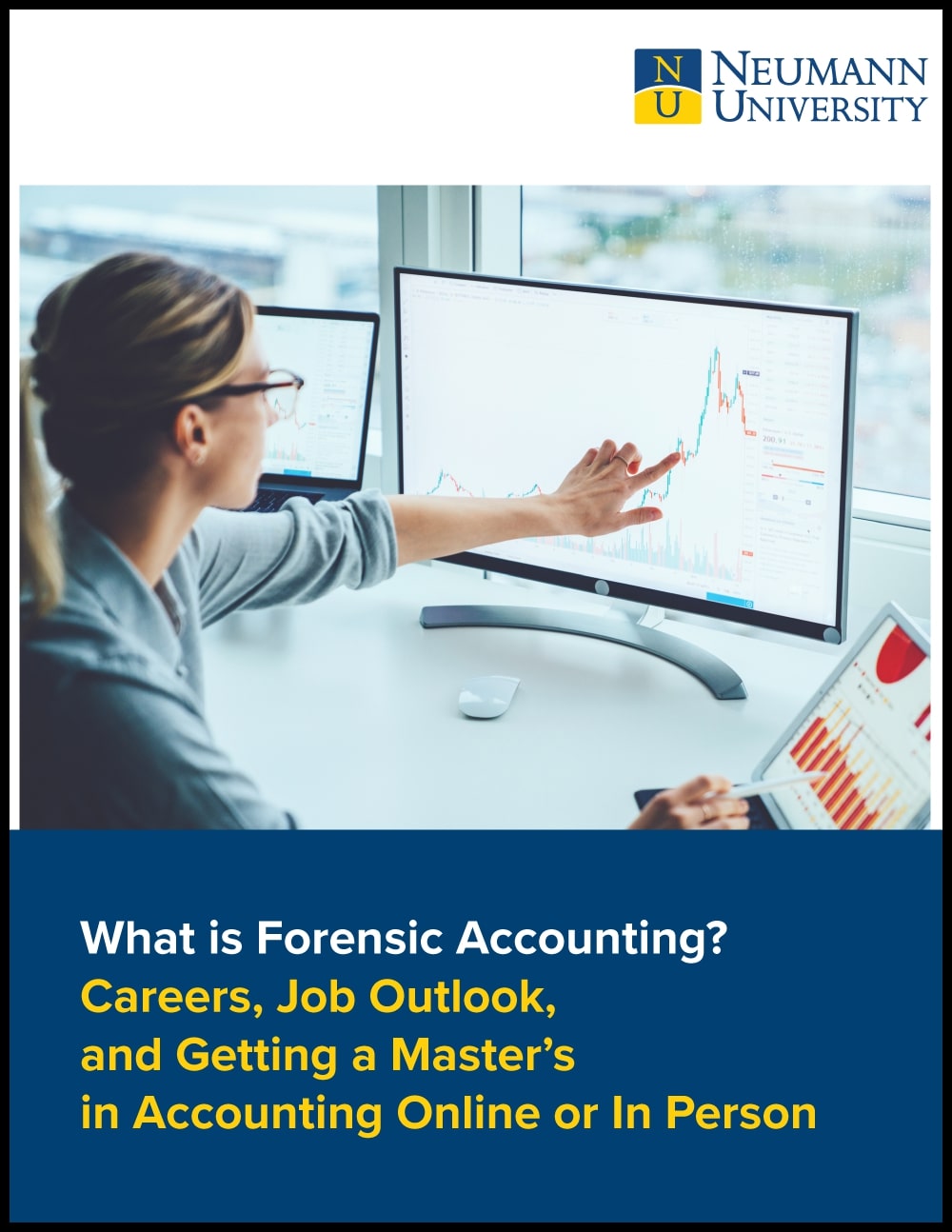 CHALLENGE
CHALLENGEMaster of Science in Forensic Accounting and Cybercrime
Summary of This Program
What is Forensic Accounting?
There are a variety of accounting types — revenue, insurance, equity, assets, taxation — but there is one incredibly important branch of accounting that has seen significant growth in recent years: forensic accounting.
In today’s competitive and rapidly-evolving professional landscape, forensic accounting remains a complex discipline — providing training in recognizing occupational fraud, white-collar crime, and financial statement misrepresentation, which is critical to the advancement and success of countless organizations and businesses.
If you’re interested in securing a meaningful career in forensic accounting, it is crucial that you pursue a degree in forensic accounting that will equip you with the skills needed to address challenges related to fraud prevention and investigation.
With this in mind, Neumann University offers a unique Master of Science in Accounting with an Emphasis on Forensics and Fraud Detection, a strategic degree program designed for future leaders in the field of forensic accounting who are passionate about uncovering white collar crime in a variety of organizations and businesses.
Related Programs
Graduate Certificate in Accounting with Emphasis in Fraud and Forensics
The 12-credit certificate is designed to establish the foundation and introduce key principles of forensic accounting.

Master's in Accounting | Features
- 30 credit hours
- Can be completed in 18 months
- Fully online instruction
- Faculty are working professionals with industry experience
- Teaches investigative skills to expose white collar crime
- Accredited by ACBSP (Accreditation Council For Business Schools and Programs)
For more information, contact our graduate admissions office at gradadultadmiss@neumann.edu or 610-361-5208.
Master's in Accounting | Learning Outcomes
- Inform the practices of fraud detection and fraud prevention in accounting through personal and professional values-based ethics, and the Franciscan Intellectual Tradition
- Evaluate legal principles and issues within the investigation of accounting fraud
- Demonstrate the knowledge of basic principles of audit risk, forensic accounting techniques, and cyber forensic investigations
- Apply the science of forensics to financial statement analysis using proper fraud terminology
- Produce scholarly reports using appropriate academic and research resources
- Work effectively as members and leaders within diverse and interdependent groups to achieve goals
- Apply various concepts of fraud, audit risk, interviewing techniques, and legal issues relative to professional auditing, forensic accounting, and fraud research
- Integrate the elements of critical thinking and ethical theory relative to forensic accounting while applying the Neumann RISES values
- Demonstrate application of information security strategy and cyber forensic investigations
- Produce fraud research guides and content specific research using appropriate academic and research resources
- Apply fraud terminology, fraud detection, tax fraud, and white-collar crime techniques
- Demonstrate scholarship and competence through effective oral and written communication both individually and as a team member
- Credits earned count toward the 150 hours needed to sit for the CPA exam
Master's in Accounting | Required Courses (30 Credits)
- ACT 510 Fraud Examinations in Society
(3 Credits) - ACT 520 Forensic Accounting and Fraud Prevention (3 Credits)
- ACT 530 Auditing for White Collar Crime and Employee Fraud (3 Credits)
- ACT 540 Computer Forensics (3 Credits)
- ACT 550 Tax Fraud (3 Credits)
- ACT 560 Business Ethics and Forensic Accounting (3 Credits)
- ACT 580 Financial Statement Analysis and Fraud (3 Credits)
- ACT 640 Legal Aspects of Fraud with Interviewing Techniques (3 Credits)
- ACT 660 Auditing and Attestation (3 Credits)
- ACT 680 Capstone (3 Credits)
Master's in Accounting | Tuition
Tuition is based on the number of credits students are enrolled in. For more information, visit the Office of Financial Assistance.
While Neumann is known for its competitive, affordable sticker price, we know that most graduates need financial assistance of some kind while enrolled in graduate school. For everything you need to know about your financial aid options, download our guide: Offsetting the Cost of Graduate School — Financial Aid for Graduate Students.
Master's in Accounting | Admissions Requirements
Applicants must submit official transcripts from all institutions attended, a graduate writing prompt, a current resume and two (2) letters of recommendation.
For more information on the admissions requirements for this program, visit our admissions page.
Graduate Assistantships at Neumann University
Neumann university offers a number of graduate assistantships in various offices throughout campus including residence life, campus ministry, enrollment management, student leadership & engagement, athletics, knights pantry, the library, university advancement and so many more.Employees of partners and their immediate family members are eligible to receive a tuition discount on select graduate programs. For questions, feel free to reach out to
gradadultadmiss@neumann.edu
Program Related Current Partners:
• Upper Chichester Township Administration
• Sun East Federal Credit Union
• City of Philadelphia
• Aqua America
• Access IT Group, Inc
• Abenity

Access Our Free eBook
What is Forensic Accounting? Careers, Job Outlook, and Getting a Master's in Accounting Online or In Person
Degree Completion and Graduate Admissions Webinar | January 7 at 4:00 PM EST
Graduate Education Webinar | January 10 at 12:00 PM EST
Frequently Asked Questions
What Can We Answer For You?
What are some jobs in forensic accounting with a master's degree?
Professionals working in forensic accounting may also pursue a variety of meaningful career roles, including:
- Fraud Examiner
- ...
What are some jobs in forensic accounting with a master's degree?
Professionals working in forensic accounting may also pursue a variety of meaningful career roles, including:
- Fraud Examiner
- Forensic accountant
- Chief accountant
- Chief executive
- Company secretary
- Risk management consultant
- Financial examiner
- Financial adviser
- Management accountant
- Internal auditor
What is the average salary of a forensic accountant?
Accountants who specialize in forensic accounting can expect a lucrative and meaningful career — both in Pennsylvania and across the nation.
...
What is the average salary of a forensic accountant?
Accountants who specialize in forensic accounting can expect a lucrative and meaningful career — both in Pennsylvania and across the nation.
Nationally: According to the Bureau of Labor Statistics, “the median annual wage for accountants and auditors was $73,000” for accountants and auditors at the national level. BLS also predicts that employment for accountants in the United States will increase 7 percent by 2030.
Pennsylvania: According to ZipRecruiter.com, forensic accountants who obtain Certified Public Accountant (CPA) status and who work in Pennsylvania make an average of $66,000 — with annual salaries as high as $106,000. Further, “Pennsylvania ranks number 23 out of 50 states nationwide for CPA salaries,” making Pennsylvania a strategic choice for CPAs looking to work in forensic accounting.Where do forensic accountants work?
Tasked with conducting examinations into the finances of an individual or business, forensic accountants are employed in a variety of important industries, such as:
Where do forensic accountants work?
Tasked with conducting examinations into the finances of an individual or business, forensic accountants are employed in a variety of important industries, such as:
- Insurance companies
- Banking establishments
- Law enforcement agencies
- Lawyer offices
- Information technology firms
- Medical facilities
- Government organizations
- Public accounting firms
- Financial institutions
- Private practice
Who teaches the courses in Neumann's master's degree program in forensic accounting?
Taught by expert faculty with first-hand experience in the field, graduate students in Neumann’s MS in Accounting program will learn from field experts like IRS agents, FBI agents, and attorneys that prosecute fraud — an incredibly valuable opportunity for future leaders in the field of forensic accounting.
What are some course examples?
Below are just a few examples of the types of courses students will take in Neumann’s master’s in Accounting program.
Fraud Examinations in Society: This course...
What are some course examples?
Below are just a few examples of the types of courses students will take in Neumann’s master’s in Accounting program.
Fraud Examinations in Society: This course examines the various legislative, administrative, and other societal remedies that have emerged in response to white-collar crime and investigates public and private sources that provide information on current issues in forensic accounting and fraud examination. Cases in securities fraud, pension fraud, environmental crimes, antitrust violations, bribery, money laundering, and corporate governance will be discussed.
Auditing for White Collar Crime and Employee Fraud: This course provides an introduction to financially motivated nonviolent crimes and examines the various types of white collar crimes that exist in society and how law enforcement identifies and investigates these crimes committed for illegal monetary gain.
Legal Aspects of Fraud with Interviewing Techniques: This course emphasizes how to strategically plan and execute effective interviews that are both skillful and ethical and examines recent legal issues related to interviewing in a fraud environment. Students will improve their ability to ask the right questions and detect deception in interviews.
What is needed to apply?
Applicants with a baccalaureate degree from a regionally accredited, degree-granting institution who have successfully completed all prerequisite courses are eligible for...
What is needed to apply?
Applicants with a baccalaureate degree from a regionally accredited, degree-granting institution who have successfully completed all prerequisite courses are eligible for entrance to the Master of Science in Accounting program, subject to the approval of the Program Director. Acceptance is on a competitive basis after submission of all credentials and an interview with the Program Director.
All applicants must submit the following:
- A completed Graduate Student Application, online
- Official transcripts from all institutions attended
- Letter of intent which outlines why you wish to pursue the Master of Science in Accounting degree
- Two official, professional letters of reference
- Current professional resume
Pro Tip: Looking for an online master’s in accounting with no GMAT or GRE requirement? Neumann University's Master of Science in Accounting does not require applicants to submit GMAT or GRE scores.
Don't Break the Bank: Here Are 6 Tips for Affording Graduate School
Although the decision to go back to school is exciting, many prospective graduate students spend a lot of time worrying about how to handle the...


